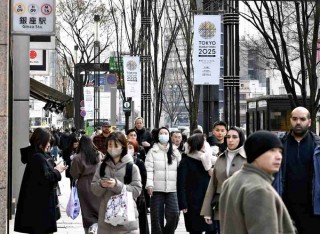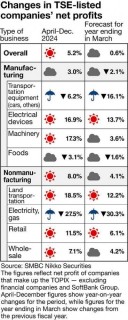Loading
Search
▼ Weak Yen Brings Strong Businesses Result Reports; Foreign Tourism Boom Also Helps Nonmanufacturers
- Category:Other
Financial results for the April-December period for companies listed on the Tokyo Stock Exchange are now in. Many of them reported strong results, helped by an increase in the number of foreign visitors to Japan and the depreciation of the yen.
For their annual financial results ending March, these companies are expected to post their fourth consecutive year of record net profits. However, there is a risk that the tariff policies of U.S. President Donald Trump will impact their future business performance.
Boom for nonmanufacturers
According to a count by SMBC Nikko Securities Inc., the 1,273 companies that make up the TOPIX — excluding financial companies and SoftBank Group Corp. — that had reported earnings as of Friday posted a total net profit of ¥34 trillion in the April-December period, up 5.2% from a year earlier. Of these, nearly 30%, or 348 companies, posted their highest profits ever.
The net profit of nonmanufacturing industries increased by 8%. The number of visitors to Japan in 2024 exceeded the level seen in 2019, before the COVID-19 pandemic, reaching a record high, which benefited department stores and transportation companies.
Isetan Mitsukoshi Holdings Ltd. reported a 70% year-on-year increase in duty-free sales to ¥129.2 billion. Its operating profit, which indicates the company’s core business earnings, reached a record high for the April-December period last year.
East Japan Railway Co. (JR East) saw a 50% increase in operating profit in its hotel business compared to the same period last year due to an increase in the number of tourists visiting Japan. Central Japan Railway Co. (JR Tokai) saw a 2.6-fold increase in transportation revenue from foreign tourists compared to the level seen before the pandemic.
Japan Airlines Co. reported an increase in profits.
“Before the pandemic, domestic flights were more profitable, but now international flights are outperforming them,” Japan Airlines Senior Vice President Masao Yumisaki said at a press conference.
AI-driven demand
The total net profit of manufacturing industries increased by 3%. The yen was briefly as strong as ¥139 level per dollar in September last year. Since then, the yen has been on a weakening trend, leading to an increase in manufacturers’ profits.
As global demand for generative artificial intelligence grew, manufacturing output increased, with electrical equipment and machinery businesses performing particularly well.
Advantest Corp. saw a 2.6-fold increase in net profit thanks to strong sales of semiconductor testing equipment for AI.
Hitachi Ltd. revised upward its net profit forecast for the fiscal year ending March 2025 due to growing demand for power grid equipment for data centers.
“There were many positive surprises that exceeded prior forecasts,” said SMBC Nikko Securities’ Hikaru Yasuda.
Automakers and other transportation equipment manufacturers had a tough time in the first half of the fiscal year through September, with net profits down 30% from the same period a year earlier, but they improved in the April-December period, with a 6.2% decrease.
Toyota Motor Corp., where fraudulent testing practices related to model certification came to light, saw sales decline, but recovered from October onwards. The depreciation of the yen contributed to the improvement of operating profit by ¥490 billion.
Concern
The total net profit of companies listed on the Tokyo Stock Exchange for the fiscal year ending March is expected to increase by 0.6% from the previous fiscal year, marking the fourth consecutive year of record highs.
According to the Bank of Japan’s quarterly Short-Term Economic Survey of Enterprises in Japan (Tankan) released in December, companies expect the yen to trade at a weighted average of ¥146.88 per dollar in fiscal 2024. The yen has continued to weaken since then, which is likely to continue to be a tailwind for major manufacturers operating overseas.
Yet, it is unclear how Trump’s tariff policy will play out.
Mitsubishi Electric Corp. supplies air conditioning and automotive equipment from Mexico to the United States.
“Demand may shift to other products produced in the United States, or prices may rise, causing a slump in consumption,” Mitsubishi Electric Chief Financial Officer Kuniaki Masuda said.
- February 18, 2025
- Comment (0)
- Trackback(0)



